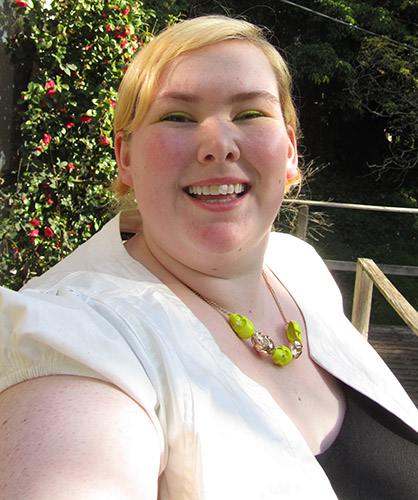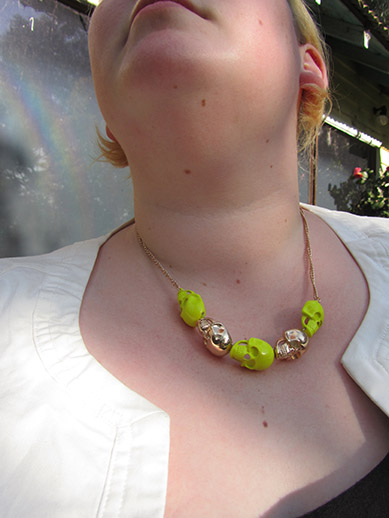I enjoy using Pinterest to find new plus size items, labels and stores and to share my favourites with other fatties. I have a Pinterest wardrobe a hundred times bigger than my real clothing collection, but I have actually bought things I first saw on someone else’s clothing board, been inspired by outfits, makeup and creative accessorising I’ve seen on Pinterest, and pinned things I liked which I later went back and bought (and reviewed on my board).
But you can’t go a day trawling through the plus size pins without seeing something like this:

“Kaitlyn Jenkins: I love this, but I hate heart disease and diabetes. It’s a shame girls are growing up in America thinking they can live healthy lives although they ultimately can’t.”

“Gelynne Smallwood: Hmmm… I don’t hear a bashing going on, but a reality check. Eventually the extra weight takes its toll on the body leading to disease. I agree she is a beautiful girl, in a beautiful outfit! But the reality of carrying extra weight catches up with you eventually. But until that woman can figure out how to shed some of her excess, kudos to her for workin’ it and looking gorgeous!”
Notice how Gelynne manages to turn a compliment for “a beautiful girl in a beautiful outfit” into a concern troll about how the “extra weight” will “catch up eventually”? She doesn’t hate fat people! She’s just worried about this poor model (whom she has never met and probably will never meet) getting sick!
Forgetting for a moment that the science about fat is not a simple matter of a specific fatness threshold tipping us into inevitable disease and premature death, why is this sort of discussion relevant to a picture of a plus size model on a pinboard dedicated to “Beautiful Plus Size Fashion”? Why do people feel like it is necessary to remind fat people that they believe (rightly or wrongly) we are at risk of disease, in the context of admiring fashion designed for fat women? Remember, we’re not talking about a post exhorting readers to spend all day on the couch eating nothing but deep-fried cheeseburgers for a year, this is an image of a fat model in a plus size dress. There is no indication of her habits or medical stats (except that she’s a bit fat, of course). As another commenter pointed out:

“Bex Loudmouth: Kaitlyn, this whole supposed ‘role model’ thing is making me mad. No matter you’re health, size, height, skin color, you need clothes. Not to mention, none of those things effect whether my currency is any good.”
Even if you believe that every fat person is minutes from death at any given time, surely you must agree that they need clothes to wear – and are fair game for companies who want their money – in the brief window of life they still have left?
I think the issue that is really behind these comments is hinted at when Bex mentions “role models”. The idea that a women is obliged to act as a suitable “role model” for other women from the moment she is photographed and her image is displayed publicly is a bit ridiculous. But fat haters are afraid that if fat people have attractive, well-dressed, confident and happy looking role models to identify with, we will start to believe that it is possible to be attractive, well-dressed, confident and happy while still remaining fat! If fat people have stylish, nice looking clothes to wear that give them an opportunity to take up and participate in fashion trends, they might start to actually like the way they look! As plus size fashion (as opposed to simply plus sized clothing) becomes more and more available and plus size models and celebrities become (however slowly) more visible, fashion’s power as an incentive to make us diet is beginning to wane. And we can’t have that.
So in the face of fat women starting to like the way they look, and starting to dress unapologetically and joyfully in bright colours, prints, tight stretchy fabrics and fashion forward styles, the attack must shift to a focus on health.
Ah, health. It’s such a curiously vague concept when you really look at it closely. What does “healthy” really mean? Free from disease? Free from physical or psychological impairment? Those definitions are a bit of a problem for people with disabilities and chronic illnesses, and besides, many clinically “overweight” or “obese” people are currently free from disease or impairment and we are told unequivocally that fat is unhealthy. Free from the risk of disease or impairment, then. But then nobody can ever be truly healthy, since anyone can fall victim to an illness or injury, anyone may have the potential for illness or premature death hidden in their genetic code, or may be unlucky regardless of the steps they take to maintain a supposedly healthy lifestyle. Elite athletes, people we often praise as role models for good health, are at risk of injury all the time and are frequently impaired for long stretches by sports-related hurts.
The reality is that “health” is a socially constructed concept that changes across historical periods, cultures and individual beliefs. That doesn’t make it meaningless, but it does make it rather problematic to use it as a measuring stick against which to test the worth of individuals.
A friend of mine once suggested to me that health – whatever we may define it as – is useful only in so far as it allows us to live the lives we want. The things we want to do (or not do) and the way we want to feel determines the extent to which the pursuit of healthiness is important to us. Some want to run marathons, play wheelchair basketball, hit home runs. Some want to bake the perfect sponge cake, paint landscapes, go for leisurely walks. For one person, wearing a size six might be more important to them than eating cake, whereas for me eating cake whenever I feel like it is more important than being a certain size. Neither is wrong, but our desires for our own lives are relevant here.
Personally, I know from experience that being a supposedly more healthy weight than my current weight involves a lot of work. Previously I considered that work worth doing. I thought about food and how much or what I was eating constantly, I spent hours at the gym and I endured physical and emotional pain, and at the time I enjoyed the results and believed they were worth the sacrifices I was making (and they did feel like sacrifices to me, although they don’t to everyone). Whether or not those results included a reduced risk of heart disease or cancer (both of which are in my family history anyway) is impossible to know. But my priorities, and what I desired from life, changed. I found that I did not want to do the things I had to do to attain and maintain that lower weight for the rest of my life. I found that there were other things I wanted to do more, and I found that the “sacrifice” of being fat no longer felt like a sacrifice to me.
I will not know if my decision to stop dieting forever has doomed me to heart disease until I either get heart disease or die of old age. And if I ever am diagnosed with heart disease, it will be hard to say whether my fatness or the eating disorder of my early twenties or simple genetic predisposition was “responsible”. I’m okay with that. I would like to contend that, on an individual basis, health statistics don’t really matter unless they are actually important to you individually.
You may argue that fatties who get heart disease will go on to use your! taxpayer! dollars! to access treatment, and so their healthiness (meaning their willingness to undertake behaviours that may or may not change their individual likelihood of developing a disease) is your concern. My response would be that – my personal belief in a right to free healthcare aside – the majority of fat people are themselves taxpayers, and are surely just as entitled as any thin person to access the fruits of their taxpayer dollars. I have private health insurance, myself, and don’t tend to use public healthcare much anyway.
What about fat people who diet stringently, successfully reduce their weight and get heart disease anyway? Or born-thin people with heart disease? Perhaps you would only bar those who live “risky lifestyles” from getting medicare-funded treatment for heart disease. In that case, should people who use mobile phones be turned away from brain cancer treatments? Drivers barred from the emergency room when they are involved in car accidents? We won’t need sports medicine any more, since athletes are well aware of the risks involved when they strap on a pair of running shoes. Surely you agree that these people, just like wilful fatties, are taking up valuable medical resources that should go to the blameless sick people who bear no responsibility for their illnesses!
Well, heck, maybe you do. I don’t, though. I think the health imperative in Australian society, and its increasing use as a weapon against fat people (not to mention other marginalised groups, which often overlap), is a problem. And health – whether it’s current lack of illness or statistically lower risk of illness in the future – certainly shouldn’t be a determiner of whether or not people deserve nice clothes.
But in the interest of fairly documenting the risks of fatness, I’ll leave you with this particular gem from the Pinterest comment stream:

“Rachel Jones: For every extra pound of fat, your body has to produce 400 miles of extra veins. This DOES tax the cardiovascular system. Is she beautiful for who she is? Sure! Everyone is. Is she overweight? Maybe so. Is obesity a problem? YES. I’m on a weight loss journey myself, so I don’t say these things lightly.”
Gosh. That would tax the cardiovascular system, wouldn’t it? It’s a wonder my heart is still beating at all.




